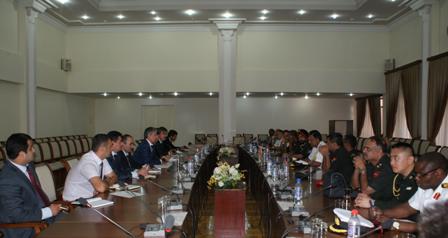DUSHANBE, September 12, 212, Asia-Plus — Issues related to training of personnel for Tajik armed forces in India have figured discussions of a delegation of the National Defence College (NDC) of India with a number of high-ranking Tajik state officials in Dushanbe.
An official source at the Ministry of Defense (MoD) of Tajikistan says the NDC delegation, led by Rear Admiral Ravindra Gaikwad, held talks with Lieutenant-General Ramil Nadyrov, First Deputy Minister of Defense also Chief of the General Staff of Tajikistan’s Armed Forces, here on September 11.
“Issues related to training of personnel for Tajik armed forces at Indian military colleges and participation of India in modernization of the Military Institute of the Ministry of Defense of Tajikistan were a major topic of the meeting,” the source said.
On the same day, the NDC delegation met with Nizomiddin Zohidov, Deputy Foreign Minister of Tajikistan.
In the course of the talks, the sides reportedly exchanged views on further expansion of many-sided cooperation between the two friendly countries.
The National Defence College of India, New Delhi is the highest seat of strategic learning for Indian Defence and Civil Services officers of the rank of Brigadier or Joint Secretary. This prestigious course is attended by hand-picked defense officers of Brigadier (one-star General) rank from friendly foreign countries also and each year, approximately 25 officers from countries like the USA, UK, Canada, France, Australia, Vietnam, Sri Lanka, Nepal, UAE etc. attend the course in New Delhi, India.
This college provides strategic leadership to the government of India in national and international security matters and also acts as a think tank on defense matters and holds a very important position in shaping up the Indian defense outlook.
NDC conducts a 47 week National Security and Strategic Study course each year which commences in the first week of January each year and finishes in the first week of December. The entire course is divided in six subjects spread over two terms. This course also involves extensive travel within and outside the country to visit Indian states and foreign countries where course members meet head of states and important decision makers to understand the political, social and strategic landscape of the state/country.




